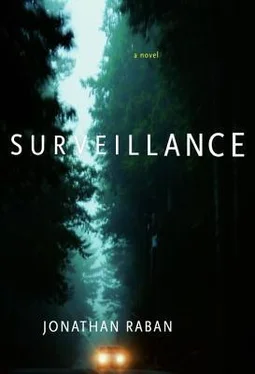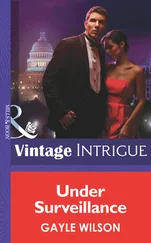First they’d used the system to catch pedophiles downloading kiddie porn from the web. Now they were trawling for political dissidents, terrorist “sympathizers,” which is to say any screwball foolish enough to get up the nose of the administration.
“Lucky your first name’s not Ahmad or Osama,” Lucy had said, with that annoying laugh of hers. “Don’t you think they’d have their hands rather full if they were chasing down every actor with lefty stickers on his car?”
But Lucy didn’t understand. They were using a net with a mesh so fine that almost anybody might be caught in it. “Either you are with us or against us.” So if you thought it important to read the Arab point of view on the situation in the Mideast, you were a likely traitor to the U.S. — especially if the FBI’d had you in its sights since 1969.
Such thoughts gave spice to Tad’s nighttime travels by mouse. Visiting Hizb-ut-Tahrir.org and Khilafah.com, he was making a lone citizen’s covert protest from deep in the grassroots against an intolerable and abusive government. Let them knock on his door. In his most expansive fantasies, he imagined Lucy, skeptical no longer, writing about it for The New Yorker, and his radical congressman, Jim McDermott, raising his case on the floor of the House. Were he ever to be offered the part of political martyr, he’d give good weight.
Tonight, though, he was doing a little data mining of his own, trawling through cyberspace for the new landlord. According to Google, there were Charles O. Lees living in Wisconsin, Michigan, Mississippi, North Carolina, Tennessee, and Florida, but none in the Seattle area. He moused over to the Post-Intelligencer site. Nothing for “Charles O. Lee,” so he tried “Charles Lee” and “Charles + Lee.”
Mr. Lee had been clever at keeping his name out of the papers, but you’d think a parking lot magnate would’ve left some kind of public trail. The only name that fit was that of a social worker, Charles Ong Lee of Shoreline, who’d died in a one-car crash on Aurora Avenue in November 1999. The report was very short: Mr. Lee, driving a white Honda Civic, had spun out on the wet and leafy pavement, hit a utility pole, and died instantly; alcohol was not thought to be involved.
The one detail that gave Tad pause was the man’s age — twenty-five, which, had he lived, would make him roughly as old as the landlord was now. Could Mr. Lee conceivably be guilty of identity theft? Probably not, but the possibility, however faint, was so tantalizing that Tad copied the story and e-mailed it to himself as the first item in the file he meant to build on Charles O. Lee. Sometime in the next few days, he’d try chatting up an attendant at one of the Excellent Parking lots. Tad had no doubt that Lee’s arrival on the scene meant either eviction or a rent hike so astronomical they’d all have to move. Certainly he was in no position to fork out three grand a month for what he thought of as an attic and Lee would grandly advertise as a “penthouse.” He’d been living in the Acropolis for more than twenty years, and it enshrined his and Michael’s happiness together. The prospect of being booted out by the insufferable Lee, railing against “scumbags” and “lowlifes” and “toerags,” was beyond enraging; it called for a manning of the barricades.
He glanced at the Trotsky quote, in Michael’s handwriting, on a strip of yellowing paper pasted above the top of his computer screen. “Americans think in terms of continents: it simplifies the study of geography, and, what is most important, provides ample room for robbery.”
A LUMINOUS thin haze hung over Elliott Bay as Lucy, at her window, watched what appeared to be a kind of maritime Noh play. Twice, a ferry had steamed into the bay from the direction of Bainbridge Island. Twice, a go-fast cigarette-type boat had approached it, settled alongside, and emitted a rather feeble puff of smoke. Twice, Coast Guard helicopters and patrol vessels had closed in on the supposedly stricken ferry, only to retreat to where they’d come from so the mock attack could begin again. There was something both comical and alarming in the unreality of this exercise, which had “fiction” written all over it. Though it was costing the taxpayers millions, nobody could possibly mistake it for the real thing.
Reality was hard to fake, as Lucy had noticed when she watched Alida, aged three, master the TV remote. It took her only a split second to recognize and dismiss a talk show, documentary, or news program in her searches for the soaps and sitcoms that held her uncomprehendingly enthralled. Still toddling, Alida knew that fiction was lit differently than fact, and in a single moving image could distinguish one from the other with deadshot accuracy.
The facile imitation of life now in progress on the bay wouldn’t fool a six-month-old. “First responders,” as they liked to call them, were being trained not for breaking news but for taking part in an episode of Law and Order or Desperate Housewives, and in the event of real horror they’d turn out to be about as much use as the cast of some crappy sitcom. Come to think of it, Tad and his friends from the Rep and ACT, accustomed as they were to stage emergencies and off-the-cuff improvisations, would almost certainly have done a better job than the Department of Homeland Security.
Tiring of the show, she set about packing their bags for the weekend. Her only real work would be talking with Augie over dinner, which brought up the difficult question of the tape recorder. First she packed it, then she unpacked it. Taping your host in his own home, Lucy decided, would be a serious breach of basic good manners. For this piece, she’d rely on memory and her notebook.
At noon, bags ready for the car, she wandered down to the Bookstore Bar in the Alexis Hotel on First. Even now it felt a little weird going into the Alexis — scene of Alida’s strange conception — but she liked the bar, the books, the quiet raised table at the back, where she always ordered a glass of sauvignon blanc, a small Caesar, and the chicken potpie. As ever, she checked out the line of drinkers up at the bar — as silly a superstition as knocking on wood, since she’d be unlikely even to recognize him now, were he to show up, which of course he never did.
For company, she’d brought the bonus double Arts and Leisure sections of the Friday edition of The New York Times. She liked reading reviews of plays she’d never see, recitals she’d never hear, exhibits she’d never visit. Lucy was no vicarious culture vulture; it was the language of the reviews themselves that she treasured. After the front-page headlines, body counts, senatorial brawls, and denunciatory op-eds, it was good to loiter in a world where “subtlety” and “restraint” were terms of praise. So, sipping wine, she read about “the innate good taste and nuanced phrasing that informs Mr. Thomas’s spectacular, crystal-clear performance” in a dance concert at NYU. A pity, Lucy thought, that Mr. Thomas was unlikely ever to run for president.
At two, she climbed the hill back to the Acropolis, and by ten to three was outside the school, the top of the Spider down as for a vacation. Alida detached herself, with lingering hugs, from a knot of friends and ambled over, wearing a miniskirt over her jeans — a fashion Lucy thought was ugly, though she’d never dare to say so.
“How was your day, Rabbit?”
“Good.”
“What’s the homework load?”
“A lot.” She groaned.
“They’ve got a big house, so you’ll have a quiet room where you can hole up. I packed your laptop.”
“Cool.” She’d put on sunglasses and was wiring herself up to her iPod.
Of course it had been sweet of Tad to buy her one, but Lucy couldn’t help loathing the little white and silver gadget, which had drawn yet another curtain between her and her disappearing child. By the time they reached the top of the street, Alida was nodding, blank-faced, to the beat in her earphones.
Читать дальше












